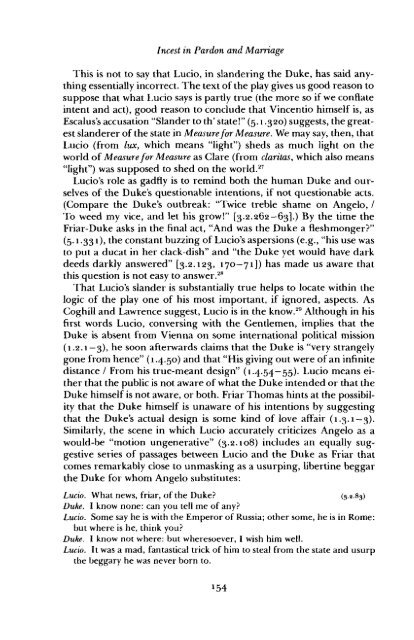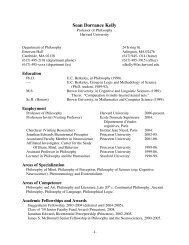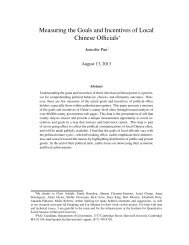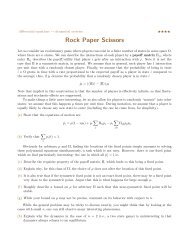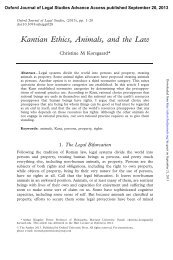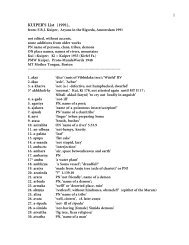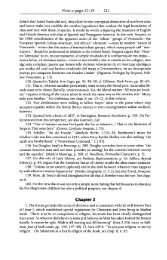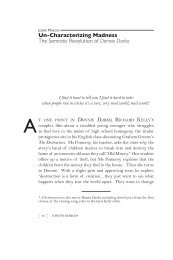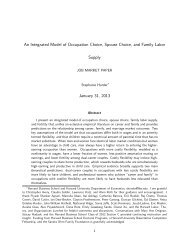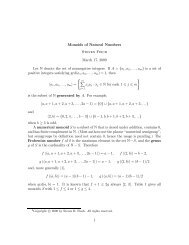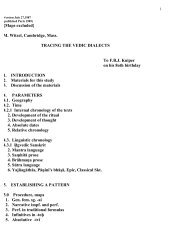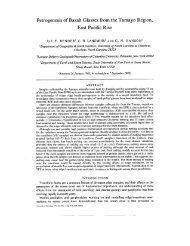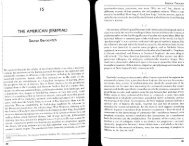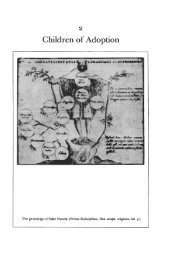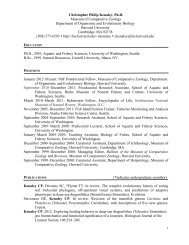Incest in Pardon and Marriage - People Fas Harvard
Incest in Pardon and Marriage - People Fas Harvard
Incest in Pardon and Marriage - People Fas Harvard
You also want an ePaper? Increase the reach of your titles
YUMPU automatically turns print PDFs into web optimized ePapers that Google loves.
<strong>Incest</strong> <strong>in</strong> <strong>Pardon</strong> <strong>and</strong> <strong>Marriage</strong><br />
This is not to say that Lucio, <strong>in</strong> sl<strong>and</strong>er<strong>in</strong>g the Duke, has said any-<br />
th<strong>in</strong>g essentially <strong>in</strong>correct. The text of the play gives us good reason to<br />
suppose that what Lucio says is partly true (the more so if we conflate<br />
<strong>in</strong>tent <strong>and</strong> act), good reason to conclude that V<strong>in</strong>centio himself is, as<br />
Escalus's accusation "Sl<strong>and</strong>er to th' state!" (5.1.320) suggests, the great-<br />
est sl<strong>and</strong>erer of the state <strong>in</strong> Measure for Measure. We may say, then, that<br />
Lucio (from lux, which means "light") sheds as much light on the<br />
world of Measure for Measure as Clare (from claritas, which also means<br />
"light") was supposed to shed on the<br />
Lucio's role as gadfly is to rem<strong>in</strong>d both the human Duke <strong>and</strong> our-<br />
selves of the Duke's questionable <strong>in</strong>tentions, if not questionable acts.<br />
(Compare the Duke's outbreak: "Twice treble shame on Angelo, /<br />
To weed my vice, <strong>and</strong> let his grow!" [3.2.262-631.) By the time the<br />
Friar-Duke asks <strong>in</strong> the f<strong>in</strong>al act, "And was the Duke a fleshmonger?"<br />
(5.1.33 I), the constant buzz<strong>in</strong>g of Lucio's aspersions (e.g., "his use was<br />
to put a ducat <strong>in</strong> her clack-dish" <strong>and</strong> "the Duke yet would have dark<br />
deeds darkly answered" [3.2.123, 170-711) has made us aware that<br />
this question is not easy to answer.2s<br />
That Lucio's sl<strong>and</strong>er is substantially true helps to locate with<strong>in</strong> the<br />
logic of the play one of his most important, if ignored, aspects. As<br />
Coghill <strong>and</strong> Lawrence suggest, Lucio is <strong>in</strong> the know.'g Although <strong>in</strong> his<br />
first words Lucio, convers<strong>in</strong>g with the Gentlemen, implies that the<br />
Duke is absent from Vienna on some <strong>in</strong>ternational political mission<br />
(1.2.1 -3), he soon afterwards claims that the Duke is "very strangely<br />
gone from hence" (1.4.50) <strong>and</strong> that "His giv<strong>in</strong>g out were of an <strong>in</strong>f<strong>in</strong>ite<br />
distance / From his true-meant design" (1.4.54-55). Lucio means ei-<br />
ther that the public is not aware of what the Duke <strong>in</strong>tended or that the<br />
Duke himself is not aware, or both. Friar Thomas h<strong>in</strong>ts at the possibil-<br />
ity that the Duke himself is unaware of his <strong>in</strong>tentions by suggest<strong>in</strong>g<br />
that the Duke's actual design is some k<strong>in</strong>d of love affair (1.3.1-3).<br />
Similarly, the scene <strong>in</strong> which Lucio accurately criticizes Angelo as a<br />
would-be "motion ungenerative" (3.2.108) <strong>in</strong>cludes an equally sug-<br />
gestive series of passages between Lucio <strong>and</strong> the Duke as Friar that<br />
comes remarkably close to unmask<strong>in</strong>g as a usurp<strong>in</strong>g, libert<strong>in</strong>e beggar<br />
the Duke for whom Angelo substitutes:<br />
Lucio. What news, friar, of the Duke? (3.2.83)<br />
Duke. I know none: can you tell me of any?<br />
Lucio. Some say he is with the Emperor of Russia; other some, he is <strong>in</strong> Rome:<br />
but where is he, th<strong>in</strong>k you?<br />
Duke. I know not where: but wheresoever, I wish him well.<br />
Lucio. It was a mad, fantastical trick of him to steal from the state <strong>and</strong> usurp<br />
the beggary he was never born to.


